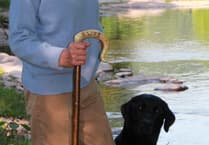THE date of the founding of the Abbey of Cwmhir has been wobbling about since the Dutch Cistercian historian Abbot Gaspar Jongelinus stated in 1543 that it was founded in 1143. This week Albert Ward, treasurer of the Abbeycwmhir Heritage Trust fixed the date at 1176 by re-erecting the recently refurbished footpath noticeboard with the date changed to 1176.
Albert did an excellent job refurbishing it and waterproofing it himself in his own workshop after the board had suffered from severe weathering. The date 1176 is also confirmed by Cadw in the Exhibition Room at the entrance to the ruins of Cwmhir Abbey owned by Mel Hamer of Home Farm.
Most recent historians agree since the discovery by Rev Dr David Williams of another Cistercian historian Angelo Manrique from Spain who wrote in his four-volume Cisterciensis Seu Verius Ecclesiastici Annales a Condito Cistercio, published in Lyons, France 1642-1659, that it was founded in both 1143 and 1176!
The choice of 1176, which Albert and the Abbeycwmhir Heritage Trust have plumped for, is based on various historical circumstances: Cwmhir’s Mother House of Whitland had only just been founded in 1140, but at Little Trefgarn and not at Whitland itself where it moved in 1155, so it would have been hardly ready to create a daughter house; although the father of Cwmhir’s founder Cadwallon ap Madog died in 1140, Cadwallon’s elder brother Meredudd was still alive until 1146 and ruling Maelienydd, the Cantref in which Abbeycwmhir is situated and was until recently the Rural Deanery of the Church of Wales.
Another reason that the earlier date is unlikely is because the area was unstable due to the incursion of the Mortimers from Wigmore; also most of the other daughter houses of Whitland were founded later – Strata Florida in 1164, Strata Marcella in 1170, Aberconway in 1186, Valle Crusis in 1201. Abbeycwmhir in 1176 fits into this pattern.
Nevertheless there are many ancient documents mentioning 1143, including a copy of the contemporary Chronicle of the Abbey of St Werbourg in Chester made for Gruffydd ap Llywellyn, father of Llywellyn ap Gruffydd the last Welsh Prince of Wales, who lived just a century after the founding. So with the debate as yet still fully decided it’s possible that one day Albert may have to get his chisel out again!




